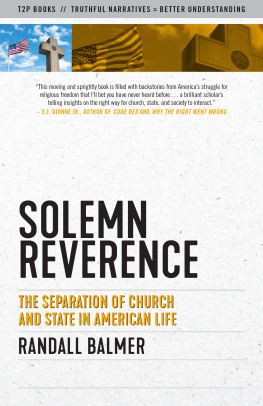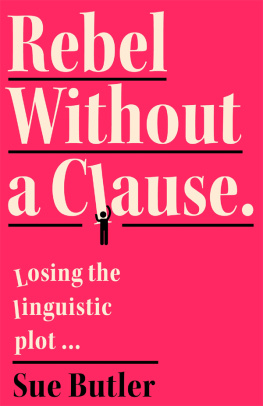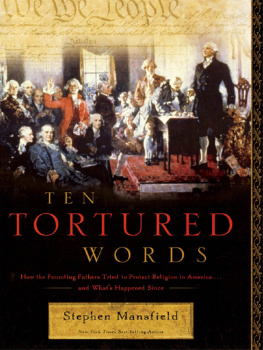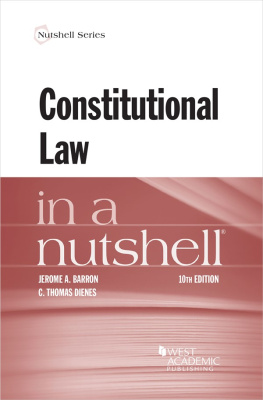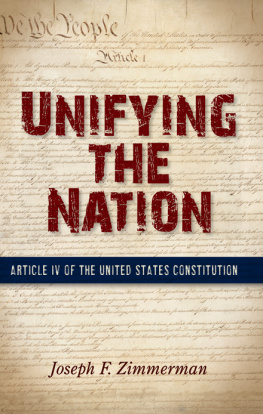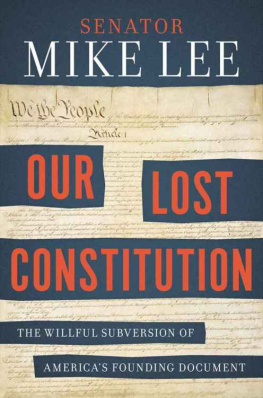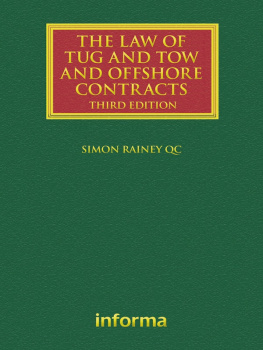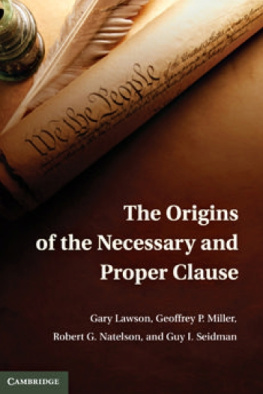Contents
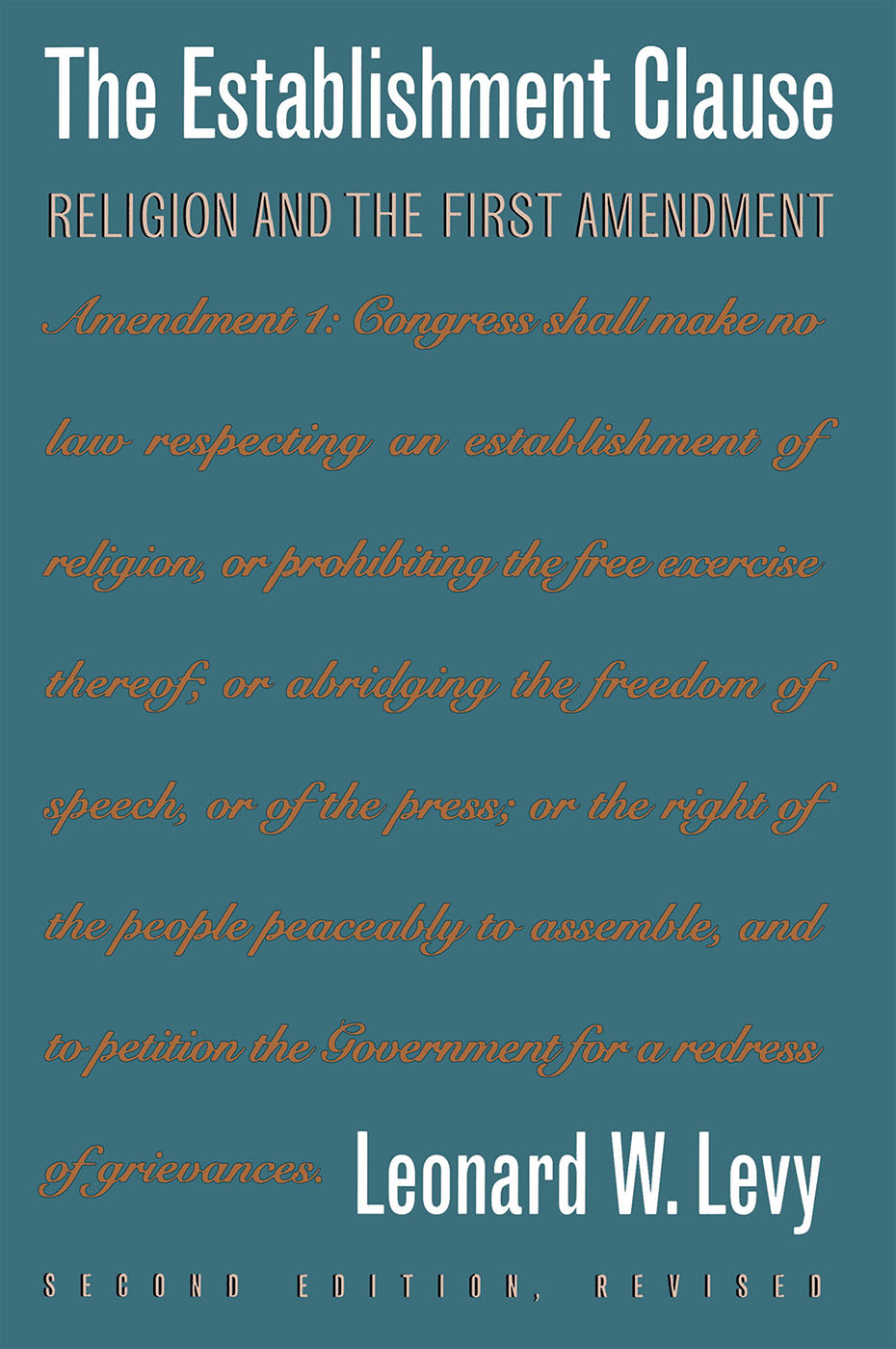
The Establishment Clause
B OOKS BY LEONARD W. LEVY
The Law of the Commonwealth and Chief Justice Shaw (1957)
Legacy of Suppression:
Freedom of Speech and Press in Early American History (1960)
The American Political Process (1963), ed.
Jefferson and Civil Liberties: The Darker Side (1963)
Major Crises in American History: Documentary Problems (1963), ed.
Congress (1964), ed.
The Judiciary (1964), ed.
Political Parties and Pressure Groups (1964), ed.
The Presidency (1964), ed.
American Constitutional Law: Historical Essays (1966)
Freedom of the Press from Zenger to Jefferson:
Early American Libertarian Theories (1966), ed.
Freedom and Reform (1967), ed.
Origins of the Fifth Amendment:
The Right Against Self-Incrimination (1968)
Essays on the Making of the Constitution (1969)
The Fourteenth Amendment and the Bill of Rights (1971), ed.
Judgments: Essays on Constitutional History (1972)
The Supreme Court under Warren (1972), ed.
Blasphemy in Massachusetts (1973), ed.
Against the Law: The Nixon Court and Criminal Justice (1974)
Jim Crow Education (1974), ed.
Treason against Goda History of the Offense of Blasphemy (1981)
Emergence of a Free Press (1985)
Constitutional Opinions: Aspects of the Bill of Rights (1986)
Encyclopedia of the American Constitution (1986), ed.
The Framing and Ratification of the Constitution (1987), ed.
The American Founding (1988), ed.
Original Intent and the Framers Constitution (1988)
Supplement One:
Encyclopedia of the American Constitution (1992)ed.
Blasphemy: Verbal Offense Against the Sacred, from Moses to Salman Rushdie (1993)
Encyclopedia of the American Presidency (1993), ed.
Seasoned Judgments:
Constitutional Rights and American History (1994)
1994 The University of North Carolina Press
All rights reserved
Manufactured in the United States of America
First edition published in 1986 by Macmillan Publishing Company.
The paper in this book meets the guidelines for permanence and durability of the Committee on Production Guidelines for Book Longevity of the Council on Library Resources.
Library of Congress Cataloging-in-Publication Data
Levy, Leonard Williams, 1923
The establishment clause : religion and the First Amendment/Leonard W.
Levy2d ed., rev.
p. cm.
Includes bibliographical references and index.
ISBN 0-8078-2156-x (cloth).
ISBN 0-8078-4466-7 (pbk.)
1. Freedom of religionUnited States. 2.
Church and stateUnited States. I. Title.
KF4783.L48 1994
342.7308 5 2dc2o
[347.302852] 94-1046
CIP
98 97 96 95 94 54321
THIS BOOK WAS DIGITALLY MANUFACTURED .
FOR ELYSE
AMENDMENT I
Congress shall make no law respecting an establishment of religion, or prohibiting the free exercise thereof; or abridging the freedom of speech, or of the press; or the right of the people peaceably to assemble, and to petition the Government for a redress of grievances.
Contents
Preface
T he establishment clause of the First Amendment (Congress shall make no law respecting an establishment of religion) does more than buttress freedom of religion, which the same amendment separately protects. Given the extraordinary religious diversity of our nation, the establishment clause functions to depoliticize religion; it thereby helps to defuse a potentially explosive situation. The clause substantially removes religious issues from the ballot box and from politics. Mr. Dooley, Finley Peter Dunnes irrepressible Irish wit, whom Justice Felix Frankfurter called a great philosopher, said of church and state: Rellijon is a quare thing. Be itself its all right. But sprinkle a litde pollyticks into it an dinnymit is bran flour compared with it. Alone it prepares a man fra better life. Combined with polyticks it hurries him to it. The establishment clause separates government and religion so that we can maintain civility between believers and unbelievers as well as among the several hundred denominations, sects, and cults that thrive in our nation, all sharing the commitment to liberty and equality that cements us together.
Notwithstanding the establishment clause, religion saturates American public life. Every president swears the oath of office with one hand on the Bible and often says So help me God. Almost every president has proclaimed days of prayer and thanksgiving to God, and, since 1952, when Congress decreed that a specific date be set aside each year for Americans to pray, the president has annually declared a National Day of Prayer on the first Thursday in May. The Supreme Court opens its session after the bailiff has asked God to save the Court and the United States. Every state legislature as well as Congress starts its daily session with a prayer from a chaplain whose salary is paid with public tax monies. All of us, including schoolchildren, when pledging allegiance to the flag, invoke God on behalf of our nation. Witnesses in court swear to tell the truth, So help me God. Our money announces that we trust in God. Our churches and synagogues are exempt from taxation. One of our great libertarian enactments, the Virginia Statute of Religious Freedom, calls upon God, as does the Preamble to the Declaration of Independence, both written by Thomas Jefferson, the advocate of a wall of separation between church and state.
Whether the duty we owe our Creator and the manner of discharging it require government aid or whether the establishment clause requires each individual to retain the sovereign power to decide for himself or herself is the subject of this book. A former president of the United States declared a National Bible Year and then lamented that God has been expelled from our public life, enough reason to examine the meaning of the establishment clause as well as the presidents mind. The same president, Ronald Reagan, believed that if evolution is taught in the public schools, the Biblical story of creation should also be taught.
When public officials, including the nations attorney general, urge a return to the original intent of the clause, an examination of history is especially warranted. Still, the observation of Clinton Rossiter, the conservative constitutional scholar, should be kept in mind. Most talk about the intent of the Framers, he wrote, whether in the orations of politicians, the opinions of judges, or the monographs of professorsis as irrelevant as it is unpersuasive, as stale as it is strained, as rhetorically absurd as it is historically unsound. Rossiter added that men of power who know least about the intent of the framers are most likely to appeal to that intent for support of their views.
Meanwhile, real questions of public policy arise, take on a constitutional dimension, and require resolution by our courts in conformity with the establishment clause. Can any part of our public taxes be spent to cover the costs of parochial schools? Can such taxes underwrite the costs of at least the secular portions of the curriculum, assuming that there are any in schools whose mission is to teach religion when teaching literature, history, biology, and physical education? Can government aid to private sectarian schools or to their pupils be provided without excessively entangling the government with religion as a result of the need to monitor the severing of the secular and the sectarian? Is the textbook, the laboratory, the field trip, the diagnostic test, or the remedial service of a religious character, as judged by government employees? Can children read the Bible in public schools, study comparative religion, see the Ten Commandments posted on the bulletin board, or use school time for devotional exercises of a sectarian or of a nonsectarian religious character (if there are such)? Aside from the unintended profanity of associating the Lord with commercialism, does the motto In God We Trust have a legitimate secular purpose and effect that conform to the establishment clause? Can the United States, which is barred from promoting religion, supply chaplains to our armed forces, our federal prisoners, or our representatives in Congress? Does the display of a nativity scene in a public square at Christmastime or of a menorah on the city hall steps at Chanukah violate the clause? Does requiring a kosher butcher to close his shop on Sunday endorse the Christian sabbath, thereby accommodating state policy with the needs of religion, contrary to the principle of separation of church and state? Does aid to religion given impartially and without preference comport with the policy embodied in the establishment clause? Does the exemption of churches from pubic taxation violate the clause? Do interfaith prayers at public school commencements? May a state enforce a statute against consumer frauds by prosecuting sellers of kosher food that an Orthodox Jewish sect claims is not kosher?


